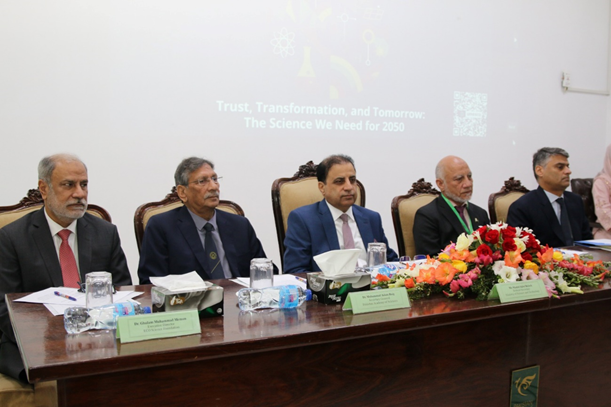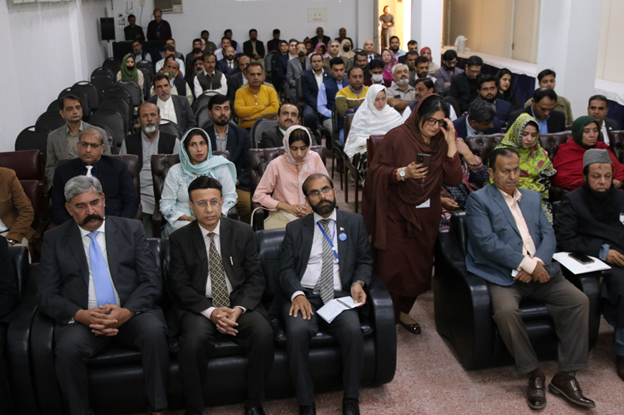ECOSF celebrates the World Science Day 2025 in Islamabad

The World Science Day for Peace and Development 2025 was celebrated in Islamabad with great enthusiasm under the theme “Trust, Transformation and Tomorrow – The Science We Need for 2050” at the Pakistan Museum of Natural History (PMNH), Islamabad. The event was jointly organized by the Economic Cooperation Organization Science Foundation (ECOSF), UNESCO Pakistan, the Pakistan Science Foundation (PSF), and the Pakistan Academy of Sciences (PAS).
The celebration brought together leading scientists, diplomats, educators, and policymakers to highlight the power of science in building trust, driving innovation, and shaping a sustainable future. The discussions The discussions emphasized how scientific knowledge and robust research and development initiatives can drive competitiveness among developing economies and help achieve the Sustainable Development Goals (SDGs).
Mr. Shahid Iqbal Baloch, Federal Secretary, Ministry of Science and Technology (MoST), graced the event as the Chief Guest. In his address, he commended PSF, PAS, and ECOSF for successfully organizing the event and for their continued efforts in promoting research and innovation in Pakistan. He urged scientists, educators, and policymakers to work collectively to create an enabling environment for research, technology, and innovation that benefits all segments of society.
Welcoming the participants, Dr. Muhammad Akmal, Chairman, PSF, appreciated partner organizations and guests for their participation. He emphasized that PSF remains committed to advancing science, research, and innovation in the country. “World Science Day reminds us of our shared responsibility to use science with trust, inclusivity, and for the well-being of humanity,” Dr. Akmal added.

Dr. Ghulam Muhammad Memon, Executive Director, ECOSF, highlighted the growing importance of regional and global cooperation in science and technology. He emphasized the importance of investing in youth and strengthening scientific capabilities to develop solutions tailored to local needs. He also encouraged the responsible use of emerging technologies such as artificial intelligence, biotechnology, and digital twins, urging developing economies to ensure these innovations bring real socio-economic benefits. He further shared that the ECOSF has been advancing capacity building in electric mobility, clean energy, STEM education, and open science and foster regional collaboration and initiatives that make technologies trusted, traded, and adopted at scale.
Dr. Aslam Baig, Secretary General, Pakistan Academy of Sciences, highlighted the importance of integrity, transparency, and effective communication in building trust in science. He reaffirmed PAS’s commitment to promoting evidence-based policymaking and maintaining high scientific standards in Pakistan.
Mr. Fawad Pashief, UNESCO Representative to Pakistan, praised the country’s active engagement in UNESCO’s science programs. He reiterated UNESCO’s support for initiatives that strengthen the role of science in peace and development. “Building trust in science is essential not only to counter misinformation but also to ensure equitable access to knowledge and reinforce public confidence,” he stated.
The event featured two thought-provoking keynote addresses.
Dr. Ahmad Ali Sarohi, Director General (Africa), Ministry of Foreign Affairs, spoke on “Science Diplomacy and Trust in a Fragmented Global Landscape,” emphasizing science diplomacy as a vital tool for fostering dialogue and cooperation among nations.
Dr. Muhammad Sabih Anwar, Professor of Physics and former Dean at LUMS, delivered the second keynote on the event’s central theme, calling for ethical scientific advancement, inclusive innovation, and stronger investments in education and research to ensure a sustainable and prosperous future.
The event concluded with a reaffirmation of collective commitment to strengthen trust in science, promote regional collaboration, and leverage innovation for peace and sustainable development.

